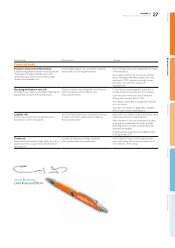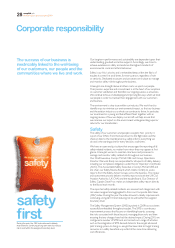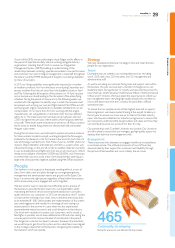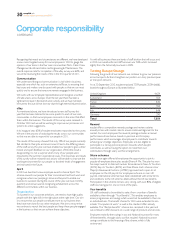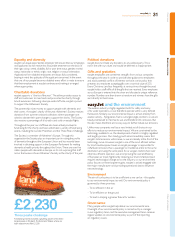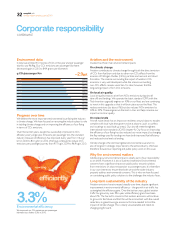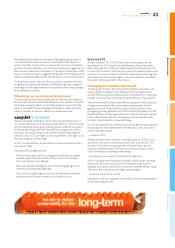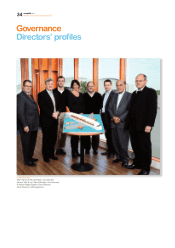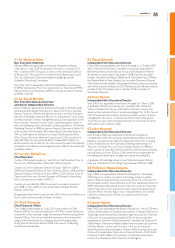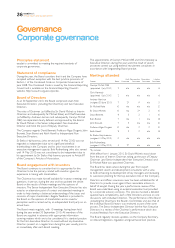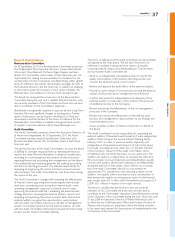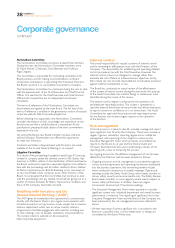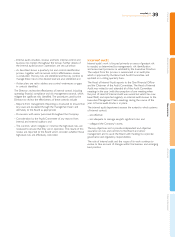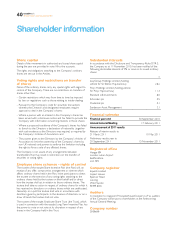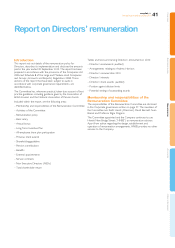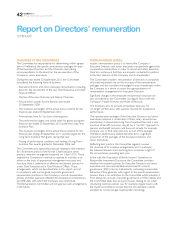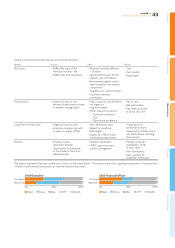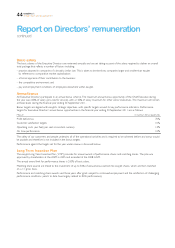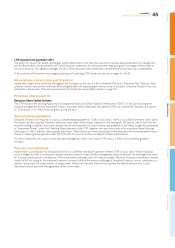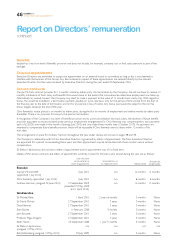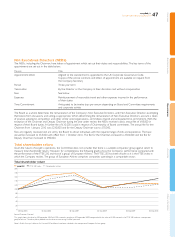EasyJet 2010 Annual Report Download - page 39
Download and view the complete annual report
Please find page 39 of the 2010 EasyJet annual report below. You can navigate through the pages in the report by either clicking on the pages listed below, or by using the keyword search tool below to find specific information within the annual report.
Overview Business review Governance Accounts Other information
easyJet plc
Annual report and accounts 2010
37
Board Committees
Remuneration Committee
At 30 September 2010, the Remuneration Committee comprised
four Independent Non Executive Directors, namely Keith Hamill
(Chairman), David Bennett, Professor Rigas Doganis and Sven
Boinet. This Committee, which meets at least twice per year, has
responsibility for making recommendations to the Board on the
compensation of senior executives and determining, within agreed
terms of reference, the specific remuneration packages for each of
the Executive Directors and the Chairman. In addition to meetings
to allot shares under the Company’s share option schemes, the
Remuneration Committee has met two times during the year.
The Board has reviewed the composition of the Remuneration
Committee during the year and is satisfied that the Directors who
are currently members of this Committee are those who are best
able to contribute to the Committee’s objectives.
Shareholders are generally required to approve all new Long Term
Incentive Plans and significant changes to existing plans. Further
details of these plans can be found in the Report on Directors’
remuneration and the full text of the terms of reference for the
Remuneration Committee is available in the governance section
of easyJet’s corporate website, http://corporate.easyJet.com.
Audit Committee
The Audit Committee comprises three Non Executive Directors, all
of whom are independent. At 30 September 2010, the Audit
Committee members were David Bennett (Chairman), John
Browett and Keith Hamill. This Committee meets at least three
times per year.
The primary function of the Audit Committee is to assist the Board
in fulfilling its oversight responsibilities by reviewing the financial
reports and other financial information in advance of publication,
reviewing on a continuing basis the systems of internal controls
regarding finance and accounting that management and the Board
have established and reviewing generally the auditing, accounting
and financial reporting processes. The ultimate responsibility for
reviewing and approving the annual and other accounts remains
with the Board. The Audit Committee has met three times during
the course of the year.
The Audit Committee is charged with reviewing the effectiveness
of internal control, approving and monitoring the internal audit
work plan, considering issues arising from internal audit’s work,
reviewing management’s response to internal control issues,
approving the external audit fee, considering the external audit
strategy and plans, reviewing the external auditors’ reports and
reviewing and approving the annual accounts. Both internal and
external auditors are given the opportunity to meet privately
with the Audit Committee without any member of management
present. It is standard practice for the external auditors to meet
with the Audit Committee without the Executive Directors being
present at each Audit Committee meeting.
The terms of reference of the Audit Committee are documented
and agreed by the main Board. The full text of the terms of
reference is available in the governance section of easyJet’s
corporate website, http://corporate.easyJet.com. The key terms
set out that the Audit Committee will:
–Serve as an independent and objective party to monitor the
quality and timeliness of the financial reporting process and
monitor the internal financial control system;
–Review and appraise the audit efforts of the external auditors;
–Provide an open avenue of communication among the external
auditors, financial and senior management and the Board;
–Confirm and assure the independence and objectivity of the
external auditors (in particular, in the context of the provision
of additional services to the Company);
– Review and ensure the effectiveness of the risk management
processes of the Company;
–Review and monitor the effectiveness of the internal audit
function and management’s responsiveness to any findings and
recommendations; and
–Assess potential conflicts of interest of Directors on behalf of
the Board.
The Audit Committee has the responsibility for appointing the
external auditors. PricewaterhouseCoopers LLP were reappointed
auditors of the Group at the Annual General Meeting held in
February 2010. In order to preserve auditor objectivity and
independence, PricewaterhouseCoopers LLP will not be asked
to provide consulting services unless this is in the best interests
of the Company. Clause 9 of the Audit Committee’s terms
of reference sets out the formal policy on non-audit work. The
auditors are asked on a regular basis to articulate the steps that
they have taken to ensure objectivity and independence. easyJet
monitors the auditors’ performance, behaviour and effectiveness
during the exercise of their duties, which informs, on an annual
basis, the Audit Committee’s decision to recommend re-
appointment. This included this year obtaining a report on the
auditors’ own quality control procedures and a consideration of
their annual audit quality and transparency report. In the financial
year, easyJet spent £0.1 million with PricewaterhouseCoopers LLP
(2009: £0.1 million) in respect of non-audit services.
The Board is satisfied that the Directors who are currently
members of this Committee are those who are best able to
contribute to the Committee’s objectives. David Bennett has served
as the Chairman of the Committee during the year. David was until
31 July 2009 an Executive Director of Abbey National plc prior
to which he was Chief Executive Officer and Finance Director of
Alliance and Leicester plc, experience which the Board considers
to be recent and relevant for the purposes of undertaking the role
as Chairman of the Committee.


